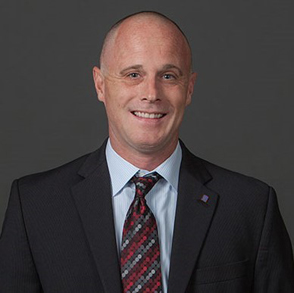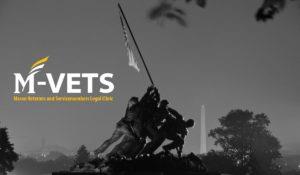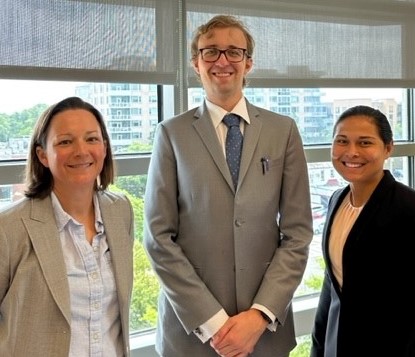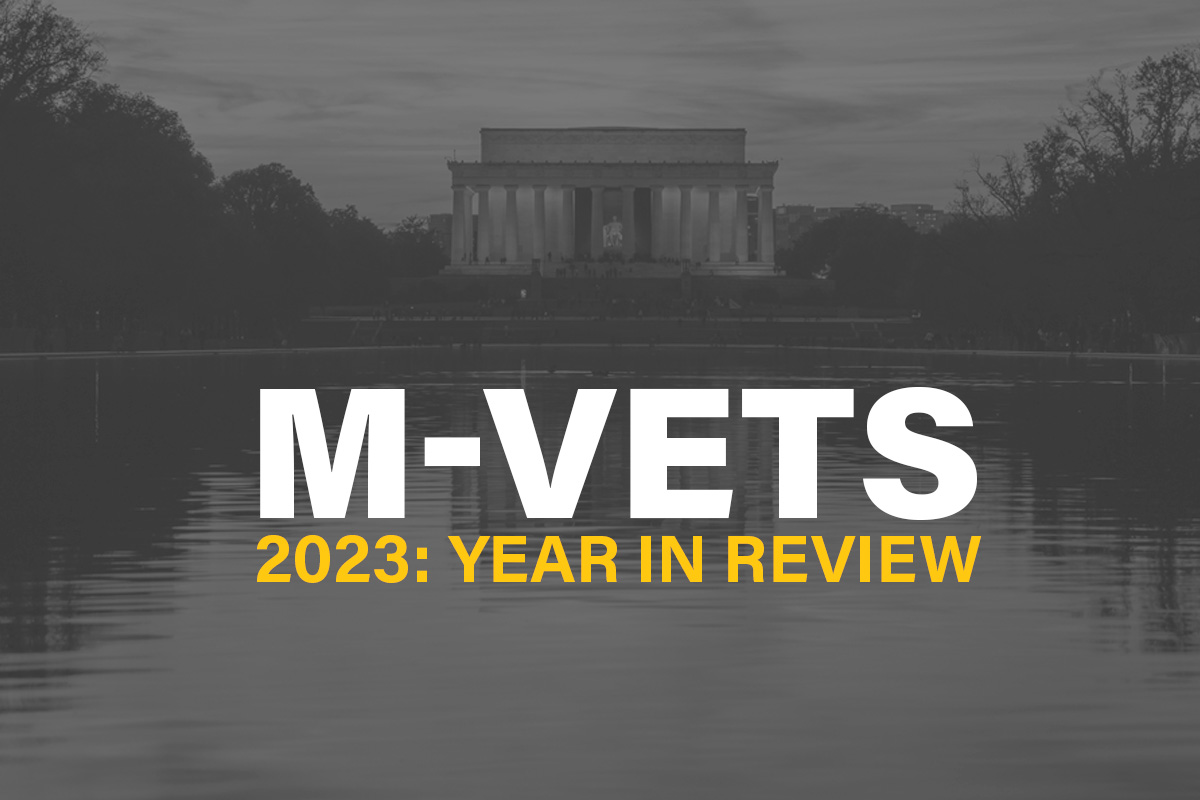DIRECTOR’S GREETING:

The Mason Veterans and Servicemembers Legal Clinic (“M-VETS”) expanded its footprint in 2023 with the grand opening of the M-VETS Advice and Referral Legal Clinic co-located in the newly redeveloped American Legion Post 139 headquarters. Hiring a new Assistant Director to staff the office, M-VETS celebrated the highly anticipated grand opening in May 2023 that included a keynote address by Virginia Governor Glenn Youngkin. In addition, M-VETS continued providing vital legal services to the military community, totaling nearly 3,000 hours of legal work during the year and providing the private market value equivalent of over $300,000 in legal services. Also this year, M-VETS received long-awaited case victories resulting in substantial benefits to its veteran-clients, including an award of nearly $400,000 in VA disability compensation for a Vietnam Veteran. We sincerely appreciate the support of our sponsors and community partners, including the Virginia Law Foundation and Arlington County Bar Foundation. We also give a heartfelt thank you to our student-advisors and administrative support staff for their continued support of the M-VETS mission. We wish our students, alumni, colleagues, supporters, and the entire military community a Happy New Year and best wishes for a happy and healthy 2024!
MILESTONES:
Since its inception in 2004, M-VETS has represented over 400 clients in a wide variety of legal matters and provided the equivalent of $5.5 million in pro bono legal services. In 2023, M-VETS reopened its office for the first time since the pandemic to offer execution services for estate planning clients and unveiled its new office co-located at the American Legion Post 139 Headquarters providing legal advice and referral services. M-VETS offers free legal representation to veterans, active duty service members, and their families while allowing law students to gain practical legal experience under the supervision of licensed attorneys. M-VETS provides representation in a variety of matters, including Virginia civil litigation matters, uncontested divorces, consumer protection matters, wills and powers of attorney, as well as assisting with matters before the VA and various administrative boards, including discharge upgrades, record corrections, military pay and entitlement matters, and VA disability benefit appeals.
M-VETS OPENS NEW OFFICE CO-LOCATED WITH AMERICAN LEGION POST 139 TO PROVIDE FREE LEGAL ADVICE AND REFERRAL SERVICES

In partnership with the American Legion Post 139, M-VETS opened a new office co-located in the newly redeveloped Post 139 Headquarters to provide free legal advice and referral services to the military community. The Grand Opening took place on May 11, 2023. It included remarks by M-VETS Director Timothy MacArthur, Secretary of Virginia’s Department of Veterans and Defense Affairs Craig Crenshaw, and a keynote address by Virginia Governor Glenn Youngkin.
Post 139 recently completed an $80 million public-private redevelopment of its headquarters on the ground floor of Terwilliger Place, a 160-unit affordable housing apartment complex with 50% veterans’ preference supported by the Arlington Partnership for Affordable Housing. Tabbed as “Leisure, Lodging, and Legal,” the 6,000-square-foot headquarters will not only serve the social and housing needs of local veterans but will offer legal services and access to vital veterans benefits.
M-VETS new outpost at Post 139 headquarters will be staffed by M-VETS Assistant Director, Raphael Johnson, an Army Veteran and former M-VETS student advisor. Mr. Johnson will provide legal advice to veterans on various matters and offer referral services to ensure those veterans are connected with the appropriate legal resources. The Virginia Department of Veterans Services (“VDVS”) also have a permanent office at Post 139 Headquarters to assist with VA claims, education benefits, and employment resources.
“We are very excited to open a new office at the American Legion Post 139 Headquarters to provide vital legal services to our military community,” M-VETS Director Timothy MacArthur said. “This project has been years in the making, and we are excited for the opportunity to expand our legal services in partnership with Post 139 and VDVS.”
“I am excited for the opportunity to rejoin M-VETS and to be able to give back to the veteran community in such an impactful way,” said M-VETS Assistant Director, Raphael Johnson. “We have worked with the leadership at Post 139 to ensure that our clients can efficiently schedule appointments and receive timely access to legal consultations in a secure environment.”
CASE VICTORY HIGHLIGHTS:
M-VETS Secures $396,000 in DVA Disability Compensation for Vietnam Veteran

The Antonin Scalia Law School Mason Veterans and Servicemembers Legal Clinic (“M-VETS”) secured a total of $396,000.00 in Department of Veterans Affairs (DVA) disability compensation payments for a veteran due to his service in Vietnam. M-VETS had previously secured the Veteran $123,000.00 in retroactive disability payments but argued at a hearing before the Board of Veterans’ Appeals (BVA) that the Veteran was entitled to additional disability payments. This effort resulted in the Veteran being paid an additional $273,000.00 for disability payments resulting from the Veteran’s service.
The Veteran initially filed the claim for disability in 2010 and, after being continuously denied by the DVA for seven years, sought the assistance of M-VETS. M-VETS corrected the Veteran’s military records before the Air Force Board for Correction of Military Records (ABCMR) to show boots-on-the-ground service in Vietnam. This evidence provided the basis for a successful Motion for Reconsideration before the BVA, which ruled the Veteran’s condition was service connected. As a result, he was paid $123,000.00 in retroactive disability payments to the original filing date 11 years earlier. However, the DVA unilaterally lowered the Veteran’s disability percentage from 100% to 10% for eight of those 11 years without providing notice to the Veteran.
“I was excited to learn that M-VETS could initially correct our client’s military records with the AFBCMR and convinced the DVA that our client was entitled to service connection for his disability,” said Timothy M. MacArthur, M-VETS Director. “We placed our Veteran in a better position than when we found him, which is always one of our main goals. Nevertheless, we knew the DVA had erred again by not giving our client due process concerning the reduced rating. Further, we believed the rating of 10% did not accurately reflect the severity of his condition. We had more work to help our client, so the Clinic filed an appeal to the BVA.”
MacArthur continued, “After we filed our appeal to the BVA in 2021, it took another two years for our case to be heard by a judge at the BVA. When our day in Court arrived, M-VETS was prepared for the hearing, and we argued our theory of the case to the Court. Fortunately, we prevailed on the merits of our case and convinced the Judge that our client’s rating should not have been reduced and that he was entitled to a 100% rating for the entire period of his disability claim. This ruling resulted in the backdated restoration of our client’s 100% rating, which provided him with the much-needed benefits he earned from his service in Vietnam. A significant amount of hard work went into this effort, and I want to thank the M-VETS student advisors who handled this matter and made this outcome possible for our Veteran.”
“Thank you from the bottom of my heart for all the work you and your staff did to help me get the benefits I was entitled to,” said the Veteran. “It would have never happened without your help. God bless you and all your staff.”
M-VETS Resumes In-Person Execution Services for Estate Planning Documents

& M-VETS Student Advisors Alden Campo and Amanda Nhek
For the first time since the pandemic, M-VETS welcomed back clients to its clinic offices located at the Antonin Scalia Law School to provide execution services for various estate planning documents prepared by M-VETS. Though M-VETS continued to provide representation for drafting estate planning documents, in-person execution services were discontinued during the pandemic.
This summer, M-VETS Student Advisors Alden Campo, Amanda Nhek, and James Caruso assisted three clients from the veteran community with drafting and executing estate planning documents, including simple wills, powers of attorney, and living wills. M-VETS provided witnesses and a notary public for the signings.
“We are excited to welcome back clients to our offices and offer execution services for the estate planning documents drafted by our clinic,” said M-VETS Deputy Director, Leigh Winstead. “Virginia law requires these documents to be executed with certain formalities, so it is important for us to have oversight on that process to ensure the documents are executed properly.”
“I was amazed how fast M-VETS responded not only to my initial call but also to the completion of my Will,” said one Veteran client. “There was continuous e-mail and phone consolation during the write up and clarification phases of the process.” Student Advisor Alden Campo stated “It was such a blessing to participate in this process and help out our clients! I hope to work in the practice area of Trusts and Estates someday, and the M-VETS Clinic has given me a fantastic opportunity for real, hands-on experience in this area.”
M-VETS provides basic estate planning services for veterans, service members, and dependents, including simple wills, powers of attorney, living wills, and codicils.
STUDENT BLOG HIGHLIGHTS:
The Veterans Treatment Court: A Resurgence of Rehabilitation as a Goal of the Criminal Justice System
Written by Summer 2023 M-VETS Student Advisor Rebecca McGuinness
Since the criminal justice system’s inception, rehabilitation has stood as a primary end towards which policymakers direct legislation.[1] The premise underpinning this objective is that the human person has the capacity to both abandon criminal activity and reform their behavior. This belief in the ability for a person to change was a uniquely American ideal.[2] Over time, however, rehabilitation has fallen out of fashion within criminal courts and amongst lawmakers alike.[3] Lawmakers emphasized, instead, punishment for the crime rather than rehabilitation of the criminal.[4]
And yet, the Veterans Treatment Court (the “VTC”) stands in sharp contrast to these trends. Where adopted, the criminal court recognizes the unique difficulties that veterans face upon leaving the military that may result in criminal conduct.[5] Not unlike in juvenile courts or drug courts, in the VTC the law serves “as a kind of therapist or therapeutic agent,” with “legal rules, legal procedures, and the roles of legal actors” functioning as “social forces.”[6] Consequently, the court offers a program in which the veteran receives comprehensive care for underlying conditions while remaining accountable to these treatment goals through regular meetings with a judge.[7] Through these services, the VTC aims at helping veterans thrive within civil society without future contact with the criminal justice system.
Rather than simply punishing the criminal behavior, the veteran works with a multi-disciplinary team to find the root of the issue.[8] This team includes counselors, Department of Veterans Affairs (the “VA”) representatives, support organizations, and veteran mentors that address a wide range of challenges a veteran may face.[9] Veterans receive individual care to promote sobriety, recovery, and stability––offering to participants a new life instead of a criminal record.[10] Further, these courts offer specialized treatment for the unique life circumstances of veterans. These circumstances often include mental health issues triggered by service and unhealthy coping mechanisms like substance abuse.
The road to graduation does not come without intense intervention, a stretch of sobriety, and radical accountability. Participants undergo regular drug and alcohol testing, the failure of which results in judicial sanctions personally tailored to the veteran’s situation. As such, the veteran receives remedial solutions as opposed to the punitive sentences emphasized in traditional courtrooms. The success of these programs has encouraged jurisdictions across the country to adopt similar measures.[11] In fact, the VTC is the fastest growing specialized court in the country, spanning forty-five states.[12]
While these courts take on the character of the community, most follow a similar blueprint. This structure focuses on four key components: (1) access to mental health resources; (2) direct support from the VA; (3) consideration of combat-related issues; and (4) veteran peer mentors.[13] In practice, the VTC allows for the systematic identification of veterans within the civilian population to connect them with resources available because of their service.[14] This identification system allows the American people to “keep in mind the enduring debt we owe our country’s military veterans” despite imperfect post-service conduct.[15]
Not all veterans, however, are eligible to participate in the VTC. These courts require a qualifying veteran to have either a substance use disorder or a treatable psychiatric condition.[16] Additionally, each court adopts its own unique criteria which may include a required nexus between the crime and the veteran’s military service; combat experience; or an honorable discharge.[17]
For those who have received true recovery, the VTC is an opportunity of substantial importance. This program provided a “clean slate, a true second chance.”[18] The question remains unanswered, though, whether this return to a rehabilitative role of the judicial system has produced lasting healing for the veteran participants at large. Given that one of the primary concerns with rehabilitation is the risk of recidivism, the long-term data regarding veteran participants will likely determine whether similar initiatives to the VTC will expand to include a wider pool of people facing criminal charges.
While most VTC programs are too young to provide adequate data, many veterans have graduated from these programs with gratitude and a new-found zeal for life. Regardless of how the VTC may impact the criminal justice system at large, these courts signify an ongoing commitment to honoring out veterans and providing these men and women with the resources owed to them because of their sacrifices.
Military Spouse License Portability and Military Families’ Tax Residency
Written by Spring 2023 M-VETS Student Advisor Hanna-Elizabeth B. Montgomery
The Veterans Auto and Education Improvement Act of 2022 was signed into law on January 5, 2023.[1] This Act makes two major changes to the Service Members Civil Relief Act, specifically concerning military families. The first change allows military spouses to receive reciprocity for their professional licenses when they move to a new state under Permanent Change of Station (PCS) orders. The second change allows military families flexibility in where they file state taxes.
1. PORTABILITY OF PROFESSIONAL LICENSES
Under PCS Orders, the Department of Defense (DOD) moves more than 400,000 service members and their families annually.[2] Every year, 14.5% of the military spouse population moves across state lines compared to the 1.1% of civilians that move across state lines.[3] Military OneSource, the Department of Defense’s (DOD) information portal for military families, estimates that “up to 34% of military spouses in the labor force are required to be fully licensed; and of those spouses, 19% experience challenges maintaining their licenses.”[4] The current Secretary of Defense, Secretary Austin, has identified this challenge as a top concern and describes the DOD’s commitment to military members and their families as “a sacred obligation … Our military families provide the strong foundation for our Force, and we owe them our full support.”[5]
The Veterans Auto and Education Improvement Act aims to alleviate this burden by ensuring that military spouses and servicemembers can transport their professional license from state to state. Specifically, when a servicemember or spouse of a servicemember relocated due to military orders, their license from the previous state must be considered valid at a “similar scope of practice” in the new state. The servicemember or spouse must (1) provide a copy of the military orders to the licensing authority in the new state; (2) remain in good standing with all licensing authorities that have issued licenses to the servicemember or spouse; and (3) submit to the authority of the new licensing jurisdiction for the purposes of “standards of practice, discipline, and fulfillment of any continuing education requirements.”[6] Law licenses are the only professional license specifically exempt under this statute.[7]
As of May 2023, there is still not a uniform process for military spouses or servicemembers to transfer their license from one state to another. In the wake of this act, multiple states, like Pennsylvania, Arkansas, and Massachusetts, have signed interstate compacts which create a uniform and relatively simple process for transferring licenses between states.[8] If there is an interstate compact agreement in a state, that process will govern.[9] The interstate compact agreements vary by profession and not all states have one. In states that lack interstate compacts, military families should check with the licensing authority in their new state. Military OneSource estimates that 66% of state licensing boards allow military spouses to begin working within 30 days.[10] Further, Secretary Austin, directed the DOD to “accelerate the development of seven additional occupational licensure interstate compacts with organizations representing multiple professions” in September of 2022.[11]
In addition to advocating for interstate compacts and reciprocity, the military provides financial support for transferring professional licenses. The Spouse License Reimbursement Program allows military spouses to be reimbursed for their licensing costs associated with a PCS move.[12] While each branch of the military has its own requirements for how to apply for the reimbursement, all can grant reimbursements of up to $1,000.[13]
2. RESIDENCE FOR TAX PURPOSES.
Filing taxes for military families is typically complicated. State taxes are usually filed based on someone’s state of residency. A residence is relatively transient. Often residency is determined by physical presence in a state. Most states have statutes defining how much of the year a person must be physically present in the state to be taxed in that state. For Virginia, a person needs to have a residence in Virginia for 183 days of the taxable year to be taxed in Virginia.[14] Other states, like California, requires taxes to be paid based off domicile as well as residency.[15]
Legally, a residence and a domicile are different, though the difference is nuanced. Someone’s domicile is his or her “true, fixed, and permanent home,” to which he or she has the “intention of returning whenever he is absent therefrom.”[16] Domicile is sticky and is difficult to remove.[17] One can change his or her domicile by moving to a different domicile (state) and intending to remain in the new domicile.[18] Servicemembers typically move from state to state under Permanent Change of Station orders. The servicemember is living in the new state for so long as their orders allow, and then they will move to another state. Although servicemembers are moving to and residing in a new state, they have no intent to remain in the new state.
Because servicemembers do not have intent to remain in the state they move to, their domicile often remains with the state in which they entered in the military. To accommodate servicemembers unique situation, Congress passed the servicemembers civil relief act in 2003. This act allowed servicemembers to file taxes in either their place of residence or their domicile. Subsequent to the SCRA, Congress passed the Military Spouses Residency Relief Act (MSRRA).[19] Since military spouses and their servicemembers often file joint taxes, the MSRRA aims to simplify the burden military families faced in becoming required to file taxes for differing states due to a PCS. The MSRRA allowed military spouses to declare the same state of residency and domicile as their servicemember spouse.[20]
Now the Veterans Auto and Education Improvement Act provides multiple options for military families to file taxes. The law states that “for any taxable year of the marriage, a servicemember and the spouse of such servicemember may elect to use for purposes of taxation, regardless of the date on which the marriage of the servicemember and the spouse occurred, any of the following: (A) The residence or domicile of the servicemember. (B) The residence or domicile of the spouse. (C) The permanent duty station of the servicemember.” [21] This means that servicemembers and spouses can choose between which state they file income taxes in. Certain states, like Florida and Texas, are well known in the military community for having no state income tax.
This Act can give servicemembers and their families up to four different states to file their taxes in. Servicemembers domicile is typically the place he or she entered in the military. Spouses may have a separate domicile from before the marriage if he or she lived in a state and had intent to remain there before marrying the servicemember. If the servicemember and his or her spouse are living apart, then the spouse and servicemember may have a different residence. The law allows servicemember and their spouse to elect the residence of either the servicemember or the spouse. Finally, the servicemember can file at his or her permanent duty station. In the National Capital Region, a servicemember may reside in a state that is not where he or she is stationed. For example, a servicemember may live in Maryland, but work at the Pentagon, in Virginia.
Conclusion
These changes are expected to help military families navigate the geographic instability of military life. The military spouse licensing relict should greatly dimmish the waiting time and costs associated with obtaining a new license. As Secretary Austin explained, “military spouses provide the strong foundation upon which their loved ones in uniform stand — and our communities and our Nation rely on their resilience. We owe them our energetic, unwavering support.”[22]
